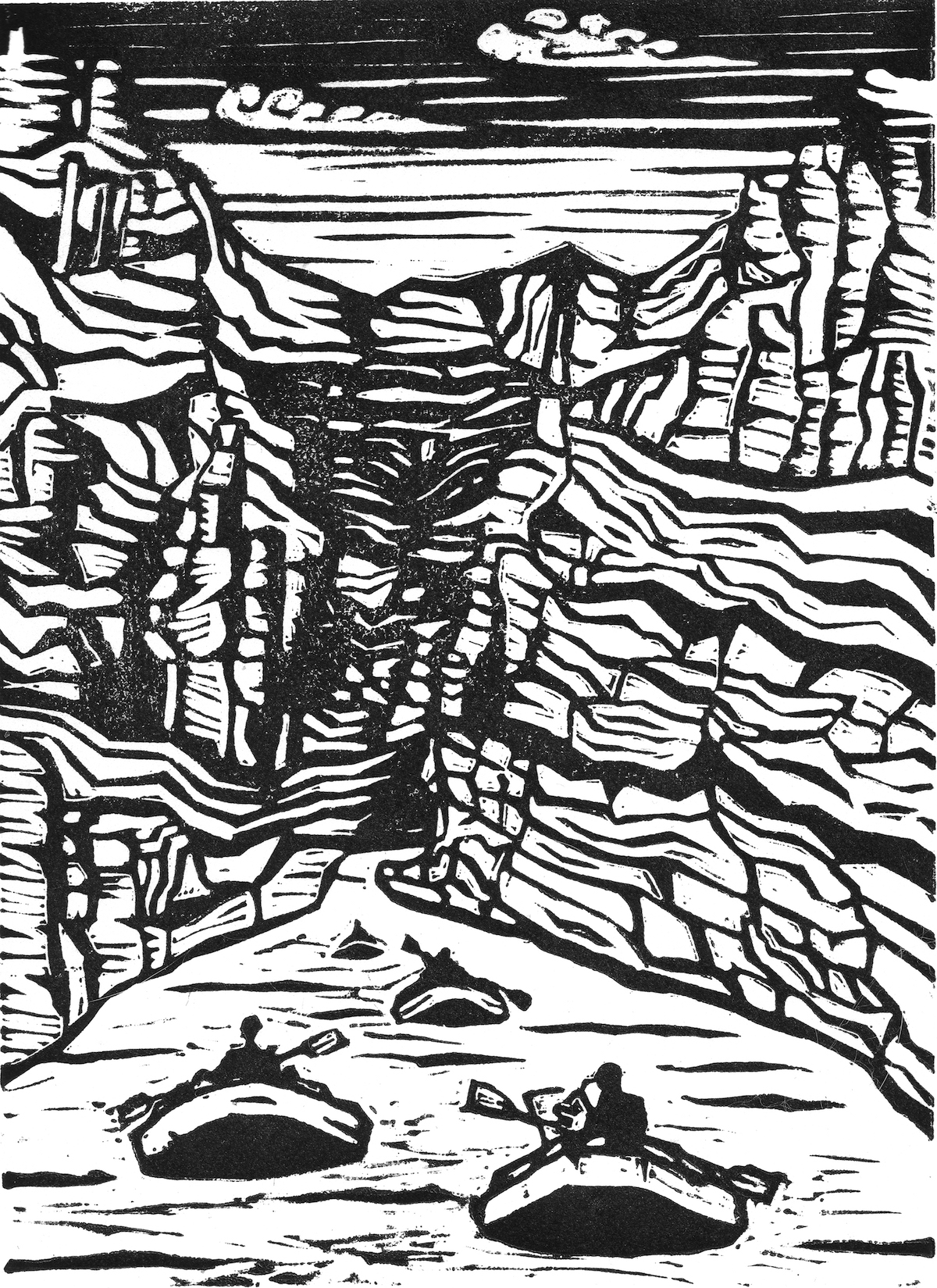Unexpected lessons in resilience on the Colorado
April 24, 2020
We’ll admit, it’s a bit of a strange moment to memorialize. Our Zipcar, a black Subaru Crosstrek, is parked at the Potash Boat Launch on the Colorado River, a gear explosion surrounding the vehicle and PC, Ellie and Chelsea digging through bags, boats and splash jackets. It’s an image Holly captured on day five of our Beyond the Pines grant in Utah’s Canyonlands National Park. In the photo, we are packing up after camping in a parking lot that, as you might imagine, was not on our itinerary.
Five days earlier, we’d grabbed lunch from Thorne and headed to Boston. Everything went according to schedule, from our flawless trip to Denver, to miraculously squeezing supplies inside the Zipcar, to our drive through Independence Pass and to various stops to pick up fresh food, fuel and carabiners. By the time we got to Utah, we felt like veritable rockstars, badasses and prepared outdoors-women who were totally in control.
Yet this shared feeling of invincibility and dominance diminished as we made our way down Shafer Trail Road, a fearsome beast of a four-wheel drive experience that was to take us from the rim of the park to the river at the bottom of the canyon. With each switch back, the road became progressively steeper, muddier and icier until we were traversing with one side of the car inches from a cliff drop. Despite our determination to make it to our trailhead, as the sun set, our prospects of accomplishing day one plummeted. That night, at our impromptu glamorous roadside campsite, we choked down dinner and huddled around our headlamp-illuminated map, hashing out a reroute.
Another road we could easily connect to would lead us out of the park, where we could reevaluate, but this meant we would no longer be able to paddle the Colorado. From a risk management standpoint, this was the right decision. But after lugging four packrafts across the country for our “wild women” adventure, it hurt to abandon the plan to enter the river. It was upsetting to come to terms with our inability to fulfill the unspoken “wildness” we had set out to vanquish. No longer would this journey be a test of strength and endurance and an exhibition of womanly outdoor finesse. The ferocious wind that slapped our tent all night seemed to shame us further. We had failed in our mission. Little did we know, this would be the first of many reluctant reroutes.
Shortly thereafter, on our way out of the park, we happened upon a boat launch that allowed us to enter the Colorado upstream, which seemed preferable to relinquishing packrafting altogether. We paddled late into the afternoon, giggly with the good fortune of our newfound plan. Again, with darkness came unease, as the solution to reversing Holly’s hypothermia was snuggling into a sleeping bag with PC, whose climbing fever posed concern. Then, ready to send our updated itinerary to Mike, we discovered our satellite phone had died. Though Ellie’s attempt to trouble-shoot connection with the outside world via Kindle is now a comedic memory, in the moment, our situation seemed too dire for laughter. We had surpassed the “wild” we were once so heartbroken to have abandoned: no one knew where we were.
The next day, we rerouted yet again. And again. And again. When the sun rose, we pushed our rafts off the sandbar, paddled what would have been our next three days of mileage at a scorching speed to arrive by lunch that afternoon and hike miles up a steep canyon to attain cell service on the aforementioned horrifying (and as we learned, sweltering and bone dry) road.
We eventually found ourselves hitchhiking three hours in the bed of a stranger’s truck. Held in by a precarious mesh net, we reflected on our undeniably vulnerable situation, grateful for a different “wild” than anticipated.
Yet as we congratulated each other on surviving this feat and eventually returning to civilization, we remained ignorant of the current struggles of the world at large. Powering on our phones and refreshing our inboxes to find President Rose’s email would bring to light the extent to which the coronavirus would soon transform society with much more significant, costly and emotional implications than those we experienced on our privileged wilderness fellowship.
Looking back on our trip, the uncertainty and vulnerability we experienced could not have been more timely. With each loss of control came strengthened camaraderie and confidence.
Coronavirus is teaching us about the fragility of our plans and preparations. It is challenging our notions of identity in relation to the spaces which we inhabit and utilize. It is exposing our illusions of control. Managing the novel coronavirus parallels navigating the wilderness, uncharted territory that requires a confluence on every level of society, from the household to local governments and even to international leaders.
With each reroute, we are learning, refining and improving. Every day, we witness unbelievable feats of human resilience, new perspective and decency to work across party lines. And this collaborative problem-solving is revealing a silver lining: when the challenges of our future arise, we will have the strength to mobilize again.
Holly Harris and Chelsea Puckett are members of the Class of 2022.


Comments
Before submitting a comment, please review our comment policy. Some key points from the policy: